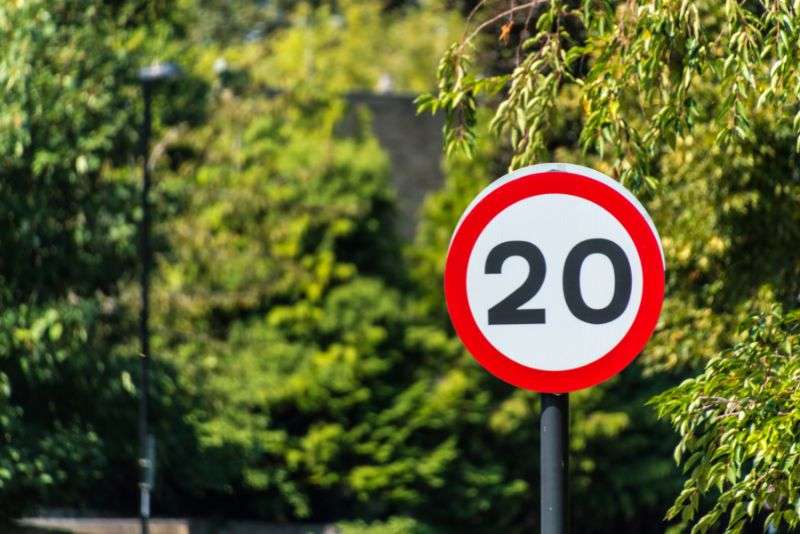Is 20mph really plenty?

Wales’ rolling green hills and grey stone villages will soon have a new sight: road signs displaying a new speed limit! The nation’s government, the Senedd, voted to make Wales the first nation in the UK to adopt a 20mph speed limit on restricted roads.
The decision has prompted a wide range of reactions from the public, policymakers, and interest groups. With a spate of articles, opinions, and studies covering the topic, we elected to review the situation and find out what this means for you, as a motorist.
Why has Wales imposed a 20mph limit?
The proposed 20mph speed limit is touted as a measure to increase road safety, reduce the number of road accidents, and create a pedestrian-friendly environment. As urban areas in Wales continue to grow and the push towards more sustainable transport options like walking and cycling intensifies, it’s crucial to have a road system that caters to everyone. But for motorists, it’s a little more complicated.
Being a driver, especially in busy areas, already comes with challenges – congestion, parking woes, fuel prices, and maintenance costs. Throwing a significant change to a speed limit into this mix could be seen as a safeguard – or a hindrance. The fact remains that driving at reduced speeds, although seemingly slower, can indeed reduce severe accidents and grant motorists more time to react to unforeseen obstacles. On the flip side, it could mean longer journeys and more traffic build-ups which could negatively impact the environment.
Wales isn’t the only place in the UK where 20mph is the standard – it’s also the case in central London. Ultimately, the goal is that, by 2041 no one will be killed or seriously injured on London roads.
The impact of speed in a collision is significant. If you hit someone at 30mph, they’re five times more likely to die than if you hit them at 20mph. The added advantage of lowering speed limits is that it also reduces emissions, thanks to a smoother driving style with less accelerations and decelerations.
Since the speed limit in central London was lowered, there have been significant improvements in road safety in London – the number of collisions resulting in serious injury or death have decreased by 25%, while collisions involving vulnerable road users have declined by 36%. But in one North Wales town, where the 20mph speed limit was trialled, residents felt it caused more problems than it solved.
In fact, they reported an increase in dangerous driving, due to the frustration at the new low speed.
Will everywhere become a 20mph zone?
With Wales pioneering the 20mph speed limit, the rest of the UK is watching closely. Various cities in England, Scotland, and Northern Ireland have experimented with or implemented similar 20mph speed zones, but Wales is the first to adopt it on such a broad scale.
It’s too early to say that this would trigger a UK-wide policy change, but there’s no denying the ripple effect! If Wales showcases improvements in road safety, it might well get other councils or governments thinking. Conversely, if challenges continue or escalate, it might dampen the enthusiasm for such measures elsewhere.
Currently, there is a petition with the signatures of more than 150,000 people on it to “rescind and remove the disastrous 20mph law”. However, Mark Drakeford, First Minister of Wales, continues to support the policy, asserting that “cutting the speed limit would protect lives and save the NHS in Wales £92 million a year.”
As with any significant change, the 20mph speed limit hasn’t gone unnoticed or undebated. Protests, petitions, and public meetings have cropped up across Wales, reflecting the vast range of emotions and opinions on the issue. Some citizens are firmly behind the idea, viewing it as a significant step towards safer streets. Others fear the potential consequences, such as increased congestion or penalisation for minor speed infringements. For a policy of this scale , it’s understandable that feelings run high. It not only affects day-to-day commuting but also influence the broader transport culture and the community feeling.
Is a slower speed limit better for insurance?
From an insurance perspective, the relationship between speed and accidents is pivotal. Theoretically, slower speeds could mean fewer severe accidents, and therefore fewer insurance claims, which could decrease premiums over time. While the long-term effect of the 20mph speed limit on insurance premiums remains speculative, insurance companies will be paying close attention to the results.
What’s more, with driving habits potentially changing, telematics-based insurance policies, commonly known as ‘black box’ insurance, which monitor driving behaviour, might also see shifts in data trends, possibly affecting costs for those using such services.
Arguments regarding the 20mph speed limit are largely in favour, with hope for it reducing emissions, creating healthier towns and cities, and fewer fatal collisions. However, if there is to be a negative impact of the policy, it may be that there is a rise in premiums because those found to have broken the limit on the public road will be adding £36 a year to their policy premium as their overall perceived risk would have increased.
Wales’ 20mph speed limit proposal is not just a number change on a signpost. It represents a larger conversation about driving, safety and modern life. Only time will reveal the full impact of this change for those driving through the green green grass of home.
Regardless of the speed limits or road changes, safety is vital. If you’re looking to renew your car insurance policy or want to discuss potential changes because of new road regulations, our team is here to help. Search Howden Insurance, find your local branch and speak with an advisor either in person or over the phone.
Sources: BBC News, TFL, WalesOnline, Evening Standard, Express



